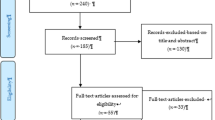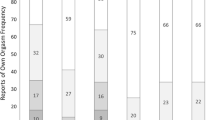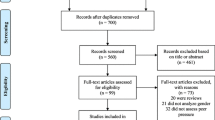Abstract
While prior research has identified multiple associations between engagement in sexting and risky behaviors, most existing studies do not take into account the contexts in which sexting occurs. The present study extends prior research by examining whether the associations between adolescents’ sexting behavior and engagement in substance use, sexual behaviors, and deviant behaviors differ depending on the relational context (within or outside of a romantic relationship) in which young people engage in sexting. Results from a survey of 1187 secondary school students (61.3% girls, n = 728) between 16 and 22 years old (M = 17.82 years; SD = 0.88) revealed that sexting with a romantic partner is not a significant marker of engagement in risk behaviors. However, single youth who engage in sexting outside of a romantic relationship are more likely to report substance use, relative to their non-sexting counterparts. These findings underscore the need to use more nuanced measures to investigate sexting and for sexual education initiatives to integrate messages about substance use.
Similar content being viewed by others
References
Agaston, P., Kowalski, R., & Limber, S. (2012). Youth views on cyberbullying. In J. Patchin & S. Hinduja (Eds.), Cyberbullying prevention and response: expert perspectives (pp. 57–71). New York, NY: Routledge.
Barrense-Dias, Y., Berchtold, A., Surís, J.-C., & Akre, C. (2017). Sexting and the definition Issue. Journal of Adolescent Health, 61(5), 544–554. https://doi.org/10.1016/j.jadohealth.2017.05.009.
Brinkley, D. Y., Ackerman, R. A., Ehrenreich, S. E., & Underwood, M. K. (2017). Sending and receiving text messages with sexual content: relations with early sexual activity and borderline personality features in late adolescence. Computers in Human Behavior, 70, 119–130. https://doi.org/10.1016/j.chb.2016.12.082.
Campbell, S. W., & Park, Y. J. (2014). Predictors of mobile sexting among teens: toward a new explanatory framework. Mobile Media & Communication, 2(1), 20–39. https://doi.org/10.1177/2050157913502645.
Centers for Disease Control and Prevention (2015). 2015 Youth Risk Behavior Survey. www.cdc.gov/yrbss.
Collins, W. A., Welsh, D. P., & Furman, W. (2009). Adolescent romantic relationships. Annual Review of Psychology, 60(1), 631–652. https://doi.org/10.1146/annurev.psych.60.110707.163459.
Cooper, K., Quayle, E., Jonsson, L., & Svedin, C. G. (2016). Adolescents and self-taken sexual images: a review of the literature. Computers in Human Behavior, 55, 706–716. https://doi.org/10.1016/j.chb.2015.10.003.
Dake, J. A., Price, J. H., Maziarz, L., & Ward, B. (2012). Prevalence and correlates of sexting behavior in adolescents. American Journal of Sexuality Education, 7(1), 1–15. https://doi.org/10.1080/15546128.2012.650959.
Dir, A. L., Cyders, M. A., & Coskunpinar, A. (2013). From the bar to the bed via mobile phone: a first test of the role of problematic alcohol use, sexting, and impulsivity-related traits in sexual hookups. Computers in Human Behavior, 29(4), 1664–1670. https://doi.org/10.1016/j.chb.2013.01.039.
Drouin, M., Ross, J., & Tobin, E. (2015). Sexting: a new, digital vehicle for intimate partner aggression? Computers in Human Behavior, 50(0), 197–204. https://doi.org/10.1016/j.chb.2015.04.001.
Englander, E., & McCoy, M. (2018). Sexting—prevalence, age, sex, and outcomes. JAMA Pediatrics, 172(4), 317–318. https://doi.org/10.1001/jamapediatrics.2017.5682.
Englander, E., & McCoy, M. (2017). Pressured sexting and revenge porn in a sample of massachusetts adolescents. International Journal of Technoethics, 8(2), 16–25.
Englander, E. K. (2015). Coerced sexting and revenge porn among teens. Bullying, teen aggression & social media 1(2) (March/April), 19–21.
Gover, A. R. (2004). Risky lifestyles and dating violence: a theoretical test of violent victimization. Journal of Criminal Justice, 32(2), 171–180. https://doi.org/10.1016/j.jcrimjus.2003.12.007.
Houck, C. D., Barker, D., Rizzo, C., Hancock, E., Norton, A., & Brown, L. K. (2014). Sexting and sexual behavior in at-risk adolescents. Pediatrics, 133(2), e276–e282. https://doi.org/10.1542/peds.2013-1157.
Jessor, R., (2014). Chapter 23: Problem behavior theory. A half-century of research on adolescent behavior and development. In R. M. Lerner, A. C. Petersen, R. K. Silbereisen, J. Brooks-Gunn (Eds.) The developmental science of adolescence: history through autobiography. (pp. 239–256). New York, NY: Psychology Press.
Klettke, B., Hallford, D. J., & Mellor, D. J. (2014). Sexting prevalence and correlates: a systematic literature review. Clinical Psychology Review, 34(1), 44–53. https://doi.org/10.1016/j.cpr.2013.10.007.
Kosenko, K., Luurs, G., & Binder, A. R. (2017). Sexting and sexual behavior, 2011–2015: a critical review and meta-analysis of a growing literature. Journal of Computer-Mediated Communication, 22(3), 141–160. https://doi.org/10.1111/jcc4.12187.
Lee, C.-H., Moak, S., & Walker, J. T. (2016). Effects of self-control, social control, and social learning on sexting behavior among south korean youths. Youth & Society, 48(2), 242–264. https://doi.org/10.1177/0044118x13490762.
Lippman, J. R., & Campbell, S. W. (2014). Damned if you do, damned if you don’t…if you’re a girl: relational and normative contexts of adolescent sexting in the United States. Journal of Children and Media, 8(4), 371–386. https://doi.org/10.1080/17482798.2014.923009.
Madigan, S., Ly, A., Rash, C. L., Van Ouytsel, J., & Temple, J. R. (2018). Prevalence of multiple forms of sexting behavior among youth: a systematic review and meta-analysis. JAMA Pediatrics, 172(4), 327–335. https://doi.org/10.1001/jamapediatrics.2017.5314.
McDaniel, B. T., & Drouin, M. (2015). Sexting among married couples: Who is doing it, and Are they more satisfied? Cyberpsychology, Behavior, and Social Networking, 18(11), 628–634. https://doi.org/10.1089/cyber.2015.0334.
Melander, L., & Hughes, V. (2018). College partner violence in the digitalage: explaining cyber aggression using routine activities theory. Partner Abuse, 9(2), 158–180. https://doi.org/10.1891/1946-6560.9.2.158.
Mitchell K. J., Finkelhor D., Jones L. M., & Wolak J. (2012). Prevalence and Characteristics of YouthSexting: A National Study. Pediatrics, 129, 13–20.https://doi.org/10.1542/peds.2011-1730.
Olweus, D. (1999). Sweden. In P. K. Smith, Y. Morita, J. Junger-Tas, D. Olweus, R. Catalano & P. Slee (Eds.), The nature of school bullying: a cross-national perspective (pp. 7–27). London, UK: Routledge.
Onrust, S. A., Otten, R., Lammers, J., & Smit, F. (2016). School-based programmes to reduce and prevent substance use in different age groups: What works for whom? Systematic review and meta-regression analysis. Clinical Psychology Review, 44, 45–59. https://doi.org/10.1016/j.cpr.2015.11.002.
Rice, E., Craddock, J., Hemler, M., Rusow, J., Plant, A., Montoya, J., & Kordic, T. (2018). Associations between sexting behaviors and sexual behaviors among mobile phone‐owning teens in Los Angeles. Child Development, 89(1), 110–117. https://doi.org/10.1111/cdev.12837.
Rice, E., Gibbs, J., Winetrobe, H., Rhoades, H., Plant, A., Montoya, J., & Kordic, T. (2014). Sexting and sexual behavior among middle school students. Pediatrics. https://doi.org/10.1542/peds.2013-2991.
Rice, E., Rhoades, H., Winetrobe, H., Sanchez, M., Montoya, J., Plant, A., & Kordic, T. (2012). Sexually explicit cell phone messaging associated with sexual risk among adolescents. Pediatrics, 130(4), 667–673. https://doi.org/10.1542/peds.2012-0021.
Ringrose, J., Gill, R., Livingstone, S., & Harvey, L. (2012). A qualitative study of children, young people and’sexting’: a report prepared for the NSPCC.
Ševčíková, A. (2016). Girls’ and boys’ experience with teen sexting in early and late adolescence. Journal of Adolescence, 51, 156–162. https://doi.org/10.1016/j.adolescence.2016.06.007.
Šmahel, D., & Subrahmanyam, K. (2014). Adolescent sexuality on the internet: a developmental perspective. In F. M. Saleh, A. Grudzinskas & A. M. Judge (Eds.), Adolescent sexual behavior in the digital age (pp. 62–85). Oxford: Oxford University Press.
Temple, J. R. (2015). A primer on teen sexting. JAACAP Connect, 2(4), 6–8.
Temple, J. R., & Choi, H. (2014). Longitudinal association between teen sexting and sexual behavior. Pediatrics, 134(5), e1287–e1292. https://doi.org/10.1542/peds.2014-1974.
Temple, J. R., Le, V. D., van den Berg, P., Ling, Y., Paul, J. A., & Temple, B. W. (2014). Brief report: teen sexting and psychosocial health. Journal of Adolescence, 37(1), 33–36. https://doi.org/10.1016/j.adolescence.2013.10.008.
Temple, J. R., & Lu, Y. (2018). Sexting from a health perspective: sexting, health, and risky sexual behaviour. In M. Walrave, J. Van Ouytsel, K. Ponnet & J. R. Temple (Eds.), Sexting: motives and risk in online sexual self-presentation (pp. 53–61). Cham: Springer International Publishing.
Temple, J. R., Paul, J. A., van den Berg, P., Le, V. D., McElhany, A., & Temple, B. W. (2012). Teen sexting and its association with sexual behaviors. Archives of Pediatrics and Adolescent Medicine, 166. https://doi.org/10.1001/archpediatrics.2012.835.
Thomas, S. E. (2018). “What should i do?”: young women’s reported dilemmas with nude photographs. Sexuality Research and Social Policy, 15(2), 192–207. https://doi.org/10.1007/s13178-017-0310-0.
Vanden Abeele, M., Campbell, S. W., Eggermont, S., & Roe, K. (2014). Sexting, mobile porn use, and peer group dynamics: boys’ and girls’ self-perceived popularity, need for popularity, and perceived peer pressure. Media Psychology, 17(1), 6–33. https://doi.org/10.1080/15213269.2013.801725.
Valkenburg, P. M., & Peter, J. (2013). The differential susceptibility to media effects model. Journal of Communication, 63(2), 221–243. https://doi.org/10.1111/jcom.12024.
Van Ouytsel, J., Ponnet, K., Walrave, M., & d’Haenens, L. (2017). Adolescent sexting from a social learning perspective. Telematics and Informatics, 34(1), 287–298. https://doi.org/10.1016/j.tele.2016.05.009.
Van Ouytsel, J., Van Gool, E., Ponnet, K., & Walrave, M. (2014). Brief report: the association between adolescents’ characteristics and engagement in sexting. Journal of Adolescence, 37(8), 1387–1391. https://doi.org/10.1016/j.adolescence.2014.10.004.
Van Ouytsel, J., Van Gool, E., Walrave, M., Ponnet, K., & Peeters, E. (2017). Sexting: adolescents’ perceptions of the applications used for, motives for, and consequences of sexting. Journal of Youth Studies, 20(4), 446–470. https://doi.org/10.1080/13676261.2016.1241865.
Van Ouytsel, J., Walrave, M., & Ponnet, K. (2018a). Adolescent sexting research: the challenges ahead. JAMA Pediatrics, 172(5), 405–406. https://doi.org/10.1001/jamapediatrics.2018.0013.
Van Ouytsel, J., Walrave, M., & Ponnet, K. (2018b). A nuanced account: Why do individuals engage in sexting? In M. Walrave, J. Van Ouytsel, K. Ponnet & J. R. Temple (Eds.), Sexting: motives and risk in online sexual self-presentation (pp. 39–51). Cham: Springer International Publishing.
Van Ouytsel, J., Walrave, M., Ponnet, K., & Heirman, W. (2015). The association between adolescent sexting, psychosocial difficulties, and risk behavior: integrative review. The Journal of School Nursing, 31(1), 54–69. https://doi.org/10.1177/1059840514541964.
Van Ouytsel, J., Walrave, M., & Van Gool, E. (2014). Sexting: between thrill and fear - how schools can respond. The Clearing House: A Journal of Educational Strategies, Issues and Ideas, 87(5), 204–212. https://doi.org/10.1080/00098655.2014.909380.
Walrave, M., & Heirman, W. (2011). Cyberbullying: predicting victimisation and perpetration. Children & Society, 25(1), 59–72. https://doi.org/10.1111/j.1099-0860.2009.00260.x.
West, J. H., Lister, C. E., Hall, P. C., Crookston, B. T., Snow, P. R., Zvietcovich, M. E., & West, R. P. (2014). Sexting among peruvian adolescents. BMC Public Health, 14(1), 811 https://doi.org/10.1186/1471-2458-14-811.
Wolfe, D. A., Crooks, C., Jaffe, P., Chiodo, D., Hughes, R., Ellis, W., & Donner, A. (2009). A school-based program to prevent adolescent dating violence: a cluster randomized trial. Archives of Pediatrics & Adolescent Medicine, 163(8), 692–699. https://doi.org/10.1001/archpediatrics.2009.69.
Wolfe, S. E., Marcum, C. D., Higgins, G. E., & Ricketts, M. L. (2016). Routine cell phone activity and exposure to sext messages: extending the generality of routine activity theory and exploring the etiology of a risky teenage behavior. Crimean & Delinquency, 62(5), 614–644. https://doi.org/10.1177/0011128714541192.
Wood, M., Barter, C., Stanley, N., Aghtaie, N., & Larkins, C. (2015). Images across Europe: the sending and receiving of sexual images and associations with interpersonal violence in young people’s relationships. Children and Youth Services Review, 59, 149–160. https://doi.org/10.1016/j.childyouth.2015.11.005.
Ybarra, M. L., & Mitchell, K. J. (2014). “Sexting” and its relation to sexual activity and sexual risk behavior in a national survey of adolescents. Journal of Adolescent Health, 55(6), 757–764. https://doi.org/10.1016/j.jadohealth.2014.07.012.
Ybarra, M. L., & Mitchell, K. J. (2015). The authors reply. Journal of Adolescent Health, 57(1), 129 https://doi.org/10.1016/j.jadohealth.2015.04.014.
Acknowledgements
The authors would like to thank the undergraduate students Lien Maldoy, Esther Sikkens, and Moniek Wallink for their assistance with the data collection. The authors would also like to thank Dr. Jessica Taylor Piotrowski for her helpful feedback on this study during the ICA-CAM research escalator session at the 67th Annual International Communication Association Conference, 25–29 May 2017, San Diego, California, USA.
Authors’ Contributions
J.V.O. conceptualized and designed the study, coordinated and supervised the data collection, carried out the data analysis, interpreted the results, drafted the initial manuscript, and revised the manuscript. K.P. and M.W. participated in the design of the study. K.P., M.W., Y.L. and J.R.T. supervised the data analysis, assisted in the interpretation of the results, and revised the manuscript. All authors read and approved the final manuscript.
Funding
The work of Dr. Joris Van Ouytsel is supported by the Research Foundation - Flanders. During a research stay at the University of Texas Medical Branch, Dr. Van Ouytsel was supported by a grant awarded by the Fulbright Commission in Belgium. The data collection for this study was supported by the Research Fund of the University of Antwerp (BOF DOC PRO 2013 - 41/FA040300/FFB130145). The study design, data collection, analysis, interpretation of the data, writing of the report and the decision to submit the article for publication were the sole responsibility of the authors and were in no way influenced by the funding institutions.
Data Sharing Declaration
This manuscript’s data will not be deposited.
Author information
Authors and Affiliations
Corresponding author
Ethics declarations
Conflict of Interest
The authors declare that they have no conflict of interest.
Ethical Approval
The study’s protocol and the consent procedures were approved by the Ethical Committee of the University of Antwerp. All procedures performed in this study involving human participants were in accordance with the ethical standards of the institutional and/or national research committee and with the 1964 Helsinki declaration and its later amendments or comparable ethical standards.
Informed Consent
Informed consent was obtained from all individual participants included in the study.
Rights and permissions
About this article
Cite this article
Van Ouytsel, J., Walrave, M., Lu, Y. et al. The Associations between Substance Use, Sexual Behavior, Deviant Behaviors and Adolescents’ Engagement in Sexting: Does Relationship Context Matter?. J Youth Adolescence 47, 2353–2370 (2018). https://doi.org/10.1007/s10964-018-0903-9
Received:
Accepted:
Published:
Issue Date:
DOI: https://doi.org/10.1007/s10964-018-0903-9




